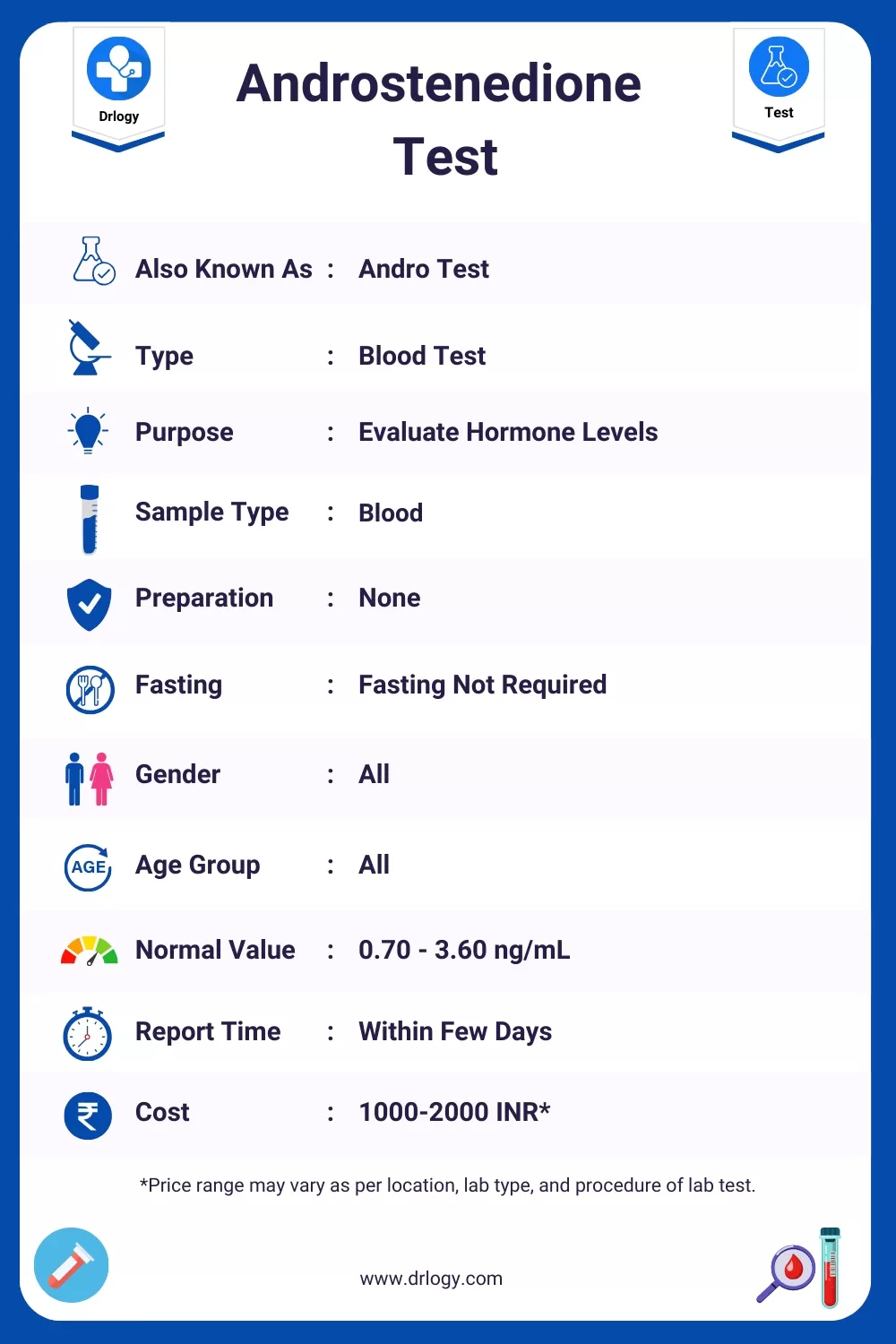
An androstenedione test measures the level of a hormone called androstenedione in the blood, which is a precursor to both male and female sex hormones. It's used to assess adrenal and ovarian function and diagnose conditions like polycystic ovary syndrome (PCOS) or adrenal tumors.
Here are the basic details of the Androstenedione Test.
| Also Known As | Andro Test |
| Type | Blood Test |
| Purpose | Evaluate Hormone Levels |
| Sample Type | Blood |
| Preparation | None |
| Fasting | Fasting Not Required |
| Gender | All |
| Age Group | All |
| Normal Value | 0.70 - 3.60 ng/mL |
| Reporting Time | Within Few Days |
| Cost | 1000-2000 INR* |
*Price range may vary as per location, lab type, and procedure of lab test.
The Androstenedione Test measures androstenedione levels in the blood.
The purpose of the Androstenedione Test is to:

Here is the basic preparation for the Androstenedione Test.
Here is the basic Androstenedione Test Procedure.
Here are the basic Understanding Androstenedione Test Results.
Here is the normal range of the Androstenedione Test.
| Androstenedione Test | Normal Range |
|---|---|
| Androstenedione Level | 0.70 - 3.60 ng/mL |
Here is the Interpretation of the Androstenedione Test.
| Androstenedione Level | Interpretation |
|---|---|
| < 0.70 ng/mL | Low Androstenedione Level may indicate adrenal gland dysfunction, adrenal insufficiency, or ovarian/testicular failure |
| 0.70 - 3.60 ng/mL | Normal Androstenedione Level |
| > 3.60 ng/mL | Elevated Androstenedione Level may indicate increased adrenal, ovarian, or testicular production, further testing needed to pinpoint the cause |
Here are potential causes of high levels of an Androstenedione Test.
| Potential Causes | Explanation |
|---|---|
| Polycystic Ovary Syndrome (PCOS) | PCOS can lead to elevated androstenedione levels due to hormonal imbalances. |
| Adrenal Hyperplasia or Tumors | Adrenal gland issues can cause excess androstenedione production. |
| Ovarian Tumors | Certain ovarian tumors may produce androstenedione, leading to elevated levels. |
| Congenital Adrenal Hyperplasia | A genetic condition can result in increased androstenedione production. |
| Medications or Supplements | Some medications or supplements can impact androstenedione levels. |
| Rare Enzyme Deficiencies | Uncommon enzyme deficiencies can lead to elevated androstenedione. |
| Obesity | Obesity may contribute to higher androstenedione levels. |
Here are potential causes of low levels of an Androstenedione Test.
| Potential Causes | Explanation |
|---|---|
| Hypopituitarism | Dysfunction or insufficiency of the pituitary gland, leading to decreased hormone production. |
| Adrenal Insufficiency | Reduced adrenal gland function, affecting androstenedione production in the adrenal glands. |
| Ovarian Dysfunction or Failure | Ovaries not producing sufficient androstenedione due to issues like premature ovarian failure. |
| Malnutrition or Severe Calorie Restriction | Inadequate nutrition affecting hormone production, including androstenedione. |
| Certain Medications or Therapies | Drugs or treatments that interfere with androstenedione synthesis or metabolism. |
| Chronic Illness or Severe Stress | Prolonged health conditions or stress impacting the endocrine system and hormone levels. |
| Genetic or Congenital Disorders affecting Androgenesis | Inherited disorders affecting androgen production, such as 17-beta-hydroxysteroid dehydrogenase deficiency. |
Here are the specimen requirements for the Androstenedione Test.
|
Specimen |
Serum |
|
|
Volume |
1 ml |
|
|
Container |
Red-top tube |
|
|
Collection |
Transfer separated serum to a plastic transport tube. |
|
|
Storage |
Refrigerate |
|
|
Sample Stability |
Temperature |
Period |
|
Room temperature |
14 days |
|
|
Refrigerated |
14 days |
|
|
Frozen |
14 days |
|
|
Freeze/thaw cycles |
Stable x2 |
|
|
Causes for Rejection |
Gross hemolysis; lipemia; gel-barrier tube. |
|
The Androstenedione Test is generally safe.
Here is the basic limitation of Androstenedione Test.
Here are some of the risk factors of the Androstenedione Test.
Here are the Doctor's recommendations or consult a specialist after the Androstenedione Test.
| Androstenedione Level | Doctor to Consult | Reason to Visit |
|---|---|---|
| High | Endocrinologist | Hormonal concerns |
| Normal | General Practitioner | Routine follow-up |
| Low | Endocrinologist | Hormonal imbalance |
Here are the estimated Androstenedione Test Prices in India with different top cities:
|
City |
Price Range (INR)* |
|
1000-2000 |
|
|
1200-2000 |
|
|
1000-2000 |
|
|
1200-2000 |
|
|
1000-2000 |
|
|
1200-2000 |
|
|
1000-2000 |
|
|
1200-2000 |
|
|
1200-2000 |
|
|
1000-2000 |
|
|
1200-2000 |
|
|
1000-2000 |
|
|
1200-2000 |
|
|
1000-2000 |
*Prices are approximate and vary depending on a specific laboratory or healthcare facility.
Summary
Overall, Androstenedione Test is a safe blood test, plays a vital role in diagnosing and monitoring hormone imbalances, particularly in conditions like polycystic ovary syndrome and adrenal disorders. Also check Drlogy Test for detailed information about all medical tests for patients, doctors, scholers and medical students.
Reference
DOCTOR'S MOST TRUSTED HEALTHCARE PLATFORM
10M+Patients
30000+Doctors
25000+Hospitals/Labs